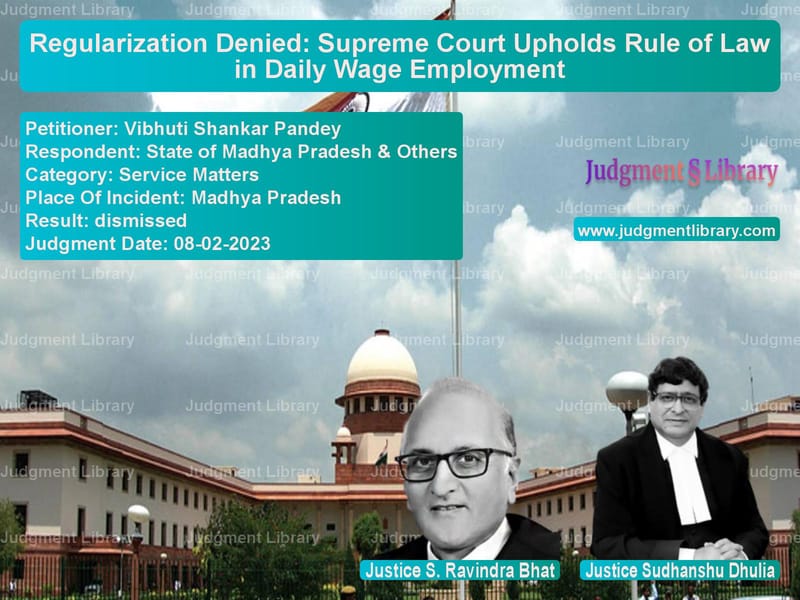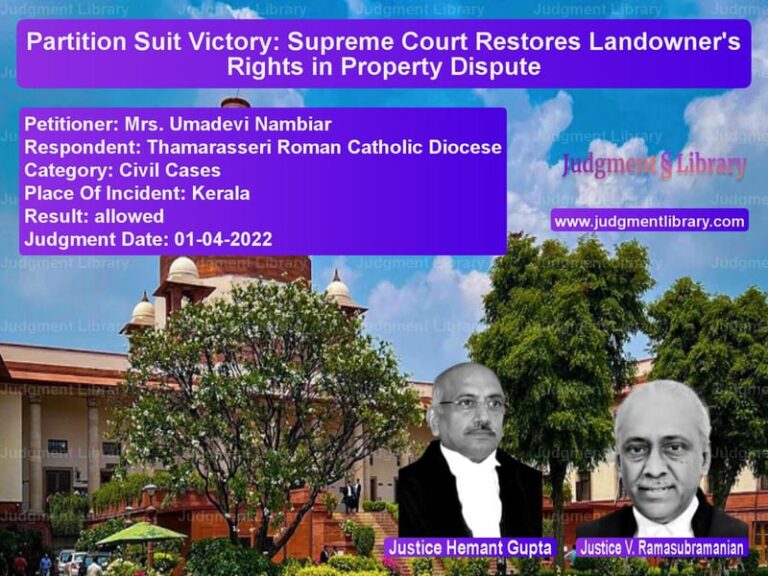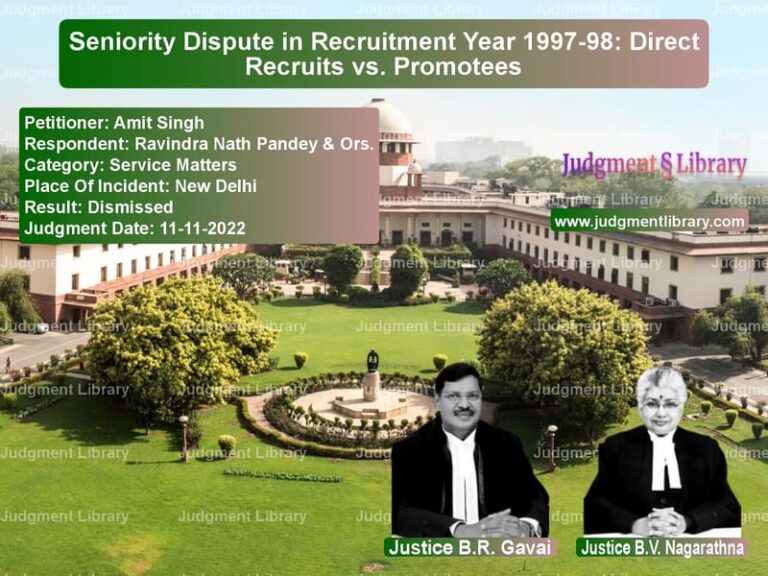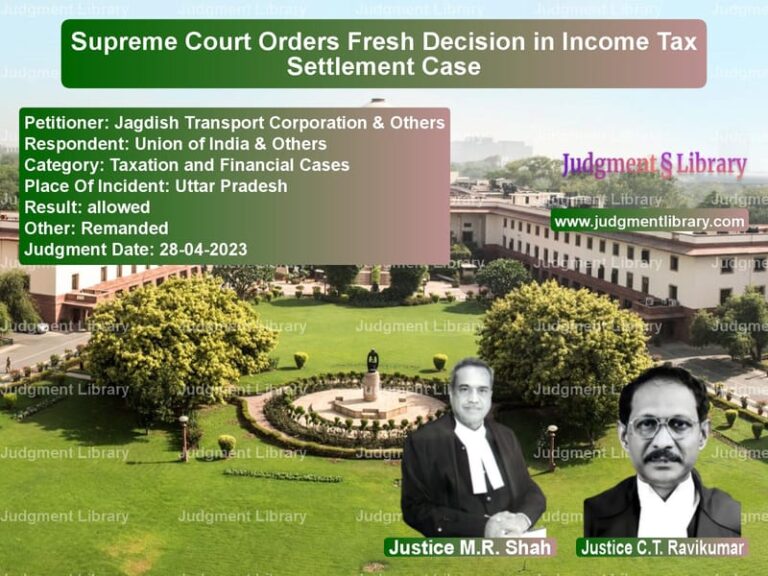Regularization Denied: Supreme Court Upholds Rule of Law in Daily Wage Employment
The Supreme Court of India, in its judgment dated February 8, 2023, ruled on a significant case concerning the regularization of a daily wage employee. The case of Vibhuti Shankar Pandey vs. State of Madhya Pradesh & Others highlights the strict conditions required for regularization under the law and reaffirms the principles laid down in the landmark case of Secretary, State of Karnataka vs. Umadevi (2006) 4 SCC 1. The Court dismissed the appeal, ruling that the petitioner had no right to regularization as his initial appointment was not made by a competent authority and there was no sanctioned post available.
Background of the Case
The appellant, Vibhuti Shankar Pandey, was engaged as a daily wage Supervisor under the State Water Resources Department of Madhya Pradesh in 1980. Over the years, he sought regularization, arguing that his long tenure as a daily wage worker entitled him to permanent employment. Although a government circular issued on December 31, 2010 relaxed the minimum qualification criteria for his post, the state authorities denied him regularization.
The appellant challenged this decision before the Madhya Pradesh High Court, where a Single Judge ruled in his favor on June 27, 2019, ordering his regularization from the date when his juniors were regularized. However, the State Government appealed this decision, and a Division Bench of the High Court overturned the Single Judge’s ruling on February 13, 2020. The appellant then moved the Supreme Court.
Arguments by the Appellant (Vibhuti Shankar Pandey)
- He had been working as a daily wage Supervisor since 1980, demonstrating a legitimate expectation for regularization.
- His juniors had been regularized before 1990, but he was arbitrarily denied the same benefit.
- The government circular of 2010 relaxed the minimum qualification requirement, and therefore, his lack of matriculation with mathematics was no longer an issue.
- The denial of regularization was unfair and discriminatory, violating Article 14 (Right to Equality) of the Constitution.
Arguments by the Respondents (State of Madhya Pradesh & Others)
- The appellant was never appointed to a sanctioned post; thus, his claim for regularization had no legal basis.
- His initial appointment was made without the approval of a competent authority, violating legal norms.
- The Supreme Court’s ruling in Umadevi (2006) had established that regularization cannot be granted unless an employee is working against a sanctioned post.
- The High Court’s Division Bench correctly applied the law by setting aside the Single Judge’s order.
Supreme Court’s Observations and Judgment
The Supreme Court upheld the High Court’s Division Bench ruling, rejecting the appellant’s plea for regularization. The Court reiterated the legal principles established in Umadevi, stating:
“The appellant had no case for regularization as his initial appointment was not made by a competent authority and there was no sanctioned post available. In view of the law laid down by the Constitution Bench in Umadevi, there is no scope for interference with the order of the Division Bench of the High Court.”
The Court found that the appellant’s claim lacked merit since his appointment was purely temporary and made outside the framework of regular recruitment processes.
Key Takeaways from the Judgment
- Regularization is not an automatic right: Mere continuation in service as a daily wager does not entitle an employee to regularization.
- Appointment must be legally valid: For regularization, an employee must be appointed by a competent authority against a sanctioned post.
- Umadevi’s principles reaffirmed: The ruling reinforces that regularization cannot be used as a means to bypass proper recruitment procedures.
- Judicial restraint in service matters: The courts cannot direct regularization contrary to established legal norms.
Implications of the Judgment
The ruling serves as a precedent for similar cases involving daily wage employees seeking regularization. It upholds the sanctity of recruitment laws and prevents backdoor entry into public service. Governments across India can rely on this judgment to ensure that employment decisions follow legal procedures.
Conclusion
The Supreme Court’s decision in this case reinforces the fundamental principles governing public employment in India. By refusing to grant regularization outside the legal framework, the Court has upheld transparency and fairness in recruitment. This judgment serves as a reminder that public employment must adhere to constitutional and legal principles, ensuring merit-based appointments rather than ad hoc regularization.
Petitioner Name: Vibhuti Shankar Pandey.Respondent Name: State of Madhya Pradesh & Others.Judgment By: Justice S. Ravindra Bhat, Justice Sudhanshu Dhulia.Place Of Incident: Madhya Pradesh.Judgment Date: 08-02-2023.
Don’t miss out on the full details! Download the complete judgment in PDF format below and gain valuable insights instantly!
Download Judgment: vibhuti-shankar-pand-vs-state-of-madhya-prad-supreme-court-of-india-judgment-dated-08-02-2023.pdf
Directly Download Judgment: Directly download this Judgment
See all petitions in Employment Disputes
See all petitions in Public Sector Employees
See all petitions in Recruitment Policies
See all petitions in Judgment by S Ravindra Bhat
See all petitions in Judgment by Sudhanshu Dhulia
See all petitions in dismissed
See all petitions in supreme court of India judgments February 2023
See all petitions in 2023 judgments
See all posts in Service Matters Category
See all allowed petitions in Service Matters Category
See all Dismissed petitions in Service Matters Category
See all partially allowed petitions in Service Matters Category







